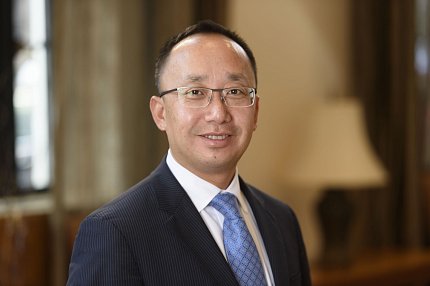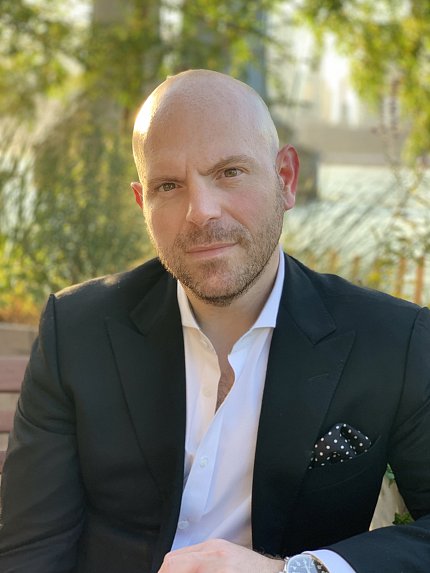Cancer Survivor Series
Mao Discusses Tailoring Integrative Care to the Patient

When 55-year-old Jada finished chemotherapy treatment for stage-2 breast cancer, her oncologist at Manhattan’s Memorial Sloan Kettering Cancer Center (MSK) prescribed anastrozole—a medicine that interferes with the production of estrogen in post-menopausal women with hormone-receptive breast cancer.
Jada adhered to her medication regimen, during which her cancer stayed away. But anastrozole’s side effects can include joint pain and stiffness. Jada’s pain was so pervasive that she considered ending the treatment.
Dr. Jun Mao, a physician at MSK and chief of the cancer center’s Integrative Medicine Service, shared Jada’s story as part of his lecture in the NCI’s Office of Cancer Survivorship (OCS) Director’s Series in January. He suspected Jada’s pain might be better managed with acupuncture.
“She told me her body ached all the time,” Mao recalled. “She wondered whether it was worth continuing to take anastrozole.”
After a few acupuncture sessions, Mao said, Jada’s pain “essentially disappeared” and she was able to complete her regimen of anastrozole. Ten years later, she remains in remission from cancer.
The lecture was introduced by Frank Licciardi, whose successful treatment of metastatic gastric cancer at MSK led him to help found its Patient & Family Advisory Council for Quality, a committee of patient and family advisors to the cancer center’s quality-of-care efforts.
Licciardi recounted his experience following his aggressive treatment. Returning to his high-pressure job in the finance industry, he experienced painful post-treatment side effects. In an effort to avoid a long period of opioid use, Licciardi turned to Mao’s integrative medicine team, hoping for relief.
“I couldn’t tie my shoes because of lymphedema,” recalled Licciardi. “[Mao] told me about lymphatic massage,” which he said brought relief and controlled the swelling and pain.
“I’m forever grateful to Dr. Mao for showing me these wonderful, non-pharmacological treatments.”
Mao’s research explores the concept of precision integrative medicine for conditions such as chronic pain, anxiety, insomnia, cognitive difficulty and joint stiffness in cancer survivors.

Precision medicine—treatment based on an individual patient’s genes, environment and other factors unique to each person—has revolutionized the way oncologists approach cancer therapies. Mao wondered if that approach might also offer some benefits to patients whose care is supplemented with integrative medicine, such as acupuncture and other treatments whose origins are in Eastern medicine.
In 2021, Mao and colleagues from MSK, the University of California San Diego, the University of Pennsylvania and a VA medical center in Philadelphia published results in JAMA Oncology of a randomized clinical trial studying 360 cancer survivors. Their trial compared electroacupuncture to auricular acupuncture in terms of relief from chronic musculoskeletal pain.
Patients in the Personalized Electroacupuncture vs Auricular Acupuncture Comparative Effectiveness (PEACE) trial reported that both forms of acupuncture—one of which administers a mild electric current to key points and one that applies acupuncture needles to points along the outer ear—helped reduce pain by as much as two points on a ten-point scale.
“Research like this allows us to build evidence” of acupuncture’s effectiveness against pain, Mao said. “So now, how do we move beyond evidence-based medicine to precision medicine for acupuncture? There’s lots of evidence [of acupuncture’s effectiveness] based on population studies. How do we apply that to individual patients?”
In a smaller 2023 study published in the journal Pain Medicine, Mao and his colleagues found that a specific polymorphism in a gene that metabolizes dopamine could be a predictor of how well a patient will respond to electroacupuncture.
“If you have the [enzyme] COMT encoded by the A allele,” said Mao, “your likelihood of responding to electroacupuncture is 70%.”
Webinars in the OCS Director’s Series focus on research that examines and addresses the long- and short-term effects of cancer and its treatment on cancer survivors and their families.
For a schedule of future webinars in this series, visit https://cancercontrol.cancer.gov/ocs/about/events/ocs-directors-series. To watch a rebroadcast of Mao’s lecture, see: https://bit.ly/3EyEPls.
